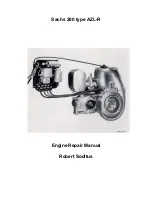
Section 3
Troubleshooting
3
3.3
1. The engine should have a minimum of 4 in. of
vacuum. A vacuum less than 4 in. is usually due
to internal wear or a bad gasket or seal allowing
air to leak into the crankcase. A pressure is
usually due to a problem with the breather.
Low/No Crankcase Vacuum or Pressure in Crankcase
Possible Cause
1. Crankcase breather clogged or inoperative.
2. Seals and/or gaskets leaking. Loose or
improperly torqued fasteners.
3. Piston blowby or leaky valves. (Confirm by
inspecting components.)
4. Restricted exhaust.
Solution
1. Disassemble breather, clean parts thoroughly,
reassemble, and recheck pressure.
2. Replace all worn or damaged seals and gaskets.
Make sure all fasteners are tightened securely. Use
appropriate torque values and sequences when
necessary.
3. Recondition piston, rings, cylinder bore, valves, and
valve guides.
4. Repair/replace restricted muffler/exhaust system.
Compression Test
A compression test or a cylinder leakdown test may be
performed to check the condition of an engine.
Insufficient compression pressure will result in a
performance loss and may indicate leaking valves or
damaged/worn piston rings.
Test the compression as follows:
1. Check/perform valve clearance adjustment.
2. Start engine if possible, and run for 3-5 minutes
to warm it up, then stop.
3. Disconnect and ground spark plug lead. Remove
the spark plug.
4. Install adapter and compression tester into spark
plug hole.
5. Move the throttle control to the full/wide open
position. Be sure the choke is off.
6. Crank engine over using recoil or electric starter
and check results.
•
Standard Compression Pressure:
400-600 kPa (57-85 psi) with ACR mechanism
in operation.
Cylinder Leakdown Test
A cylinder leakdown test can be a valuable alternative
to a compression test, especially on engines with ACR.
By pressurizing the combustion chamber from an
external air source you can determine if the valves or
rings are leaking, and how badly.
Cylinder leakdown tester is a simple and inexpensive
tester for small engines. The tester includes a quick
disconnect for attaching the adapter hose and a
holding tool.
Test the cylinder leakdown as follows:
1. Run engine for 3-5 minutes to warm it up.
2. Remove spark plug and air filter from engine.
3. Rotate crankshaft until piston (of cylinder being
tested) is at top dead center (TDC) of the
compression stroke. You will need to hold engine
in this position while testing.
a. If the PTO end of the crankshaft is accessible,
the holding tool supplied with the tester can
be used. Loosen the holding tool screws and
expand the opening. Slide the tool onto the
crankshaft as close as possible to the PTO
face of the crankcase. If the slot in the tool can
be aligned with one of the holes on the PTO
face, find a bolt of appropriate length and
thread size. Insert the bolt through the slot,
and thread it into the selected hole, to prevent
the tool from moving. Tighten the screws to
lock the holding tool onto the crankshaft. If a
PTO face hole is not accessible, tighten the
screws to lock the holding tool onto the
crankshaft. Insert the end of a 3/8" breaker
bar into the slot, so the handle of the breaker
bar is perpendicular to the crankshaft.
2. Refer to the following chart for possible causes
and solutions.
Summary of Contents for Command PRO CS
Page 1: ...6 59 0 18 25 217 5 1 6 7 200 1 352 6 3...
Page 2: ......
Page 4: ......
Page 11: ...6HFWLRQ 6DIHW DQG HQHUDO QIRUPDWLRQ 6WRUDJH...
Page 15: ...6HFWLRQ 6DIHW DQG HQHUDO QIRUPDWLRQ HQHUDO 6SHFL FDWLRQV...
Page 17: ...6HFWLRQ 6DIHW DQG HQHUDO QIRUPDWLRQ RQQHFWLQJ 5RG FRQW UDQNFDVH UDQNVKDIW...
Page 18: ...6HFWLRQ 6DIHW DQG HQHUDO QIRUPDWLRQ UDQNVKDIW FRQW OLQGHU RUH OLQGHU HDG OHFWULF 6WDUWHU...
Page 20: ...6HFWLRQ 6DIHW DQG HQHUDO QIRUPDWLRQ 3LVWRQ 3LVWRQ 5LQJV DQG 3LVWRQ 3LQ FRQW...
Page 50: ...6HFWLRQ XEULFDWLRQ 6 VWHP...
Page 56: ...7 6 Section 7 Retractable Starter...
Page 92: ...8 36 Section 8 Electrical System and Components...
Page 128: ...10 16 Section 10 Internal Components...
Page 161: ......
















































